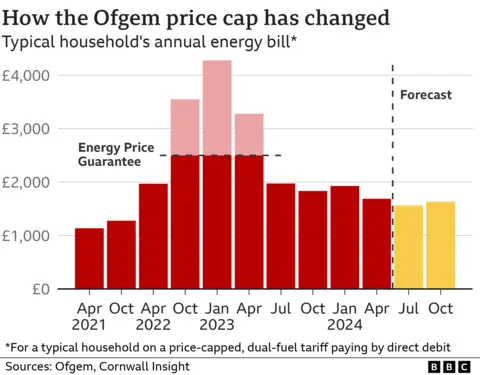Annual household energy bills could fall by a further 7% in July, forecasts suggest, with the new price cap being announced later.
Regulator Ofgem will outline the latest quarterly level for England, Wales and Scotland at 07:00 BST and is widely expected to lower the cap.
Consultancy Cornwall Insight predicts a typical household bill could fall from £1,690 a year to £1,574.
The cap sets a limit on the maximum price for each unit of energy, not the total bill.
That means if you use more energy, you will pay more.
It affects the gas and electricity bills of 29 million households, but does not impact customers in Northern Ireland, where the sector is regulated differently but where prices are also falling.
Easing burden
Energy prices are at their lowest level since Russia’s invasion of Ukraine in February 2022. However, bills remain well above pre-pandemic levels.
In April, a lower cap meant a drop of £238 a year, or around £20 a month, for a household using a typical amount of energy.

Those on prepayment meters, who tend to top up meters during the colder, darker months will see less immediate impact if there is a summer drop in prices, following the previous fall in April.
The vast majority of households pay by direct debit, and their payments are smoothed out over the year. They can expect more information from their supplier in the coming days about any price changes.
Suppliers will judge the level of direct debit on previous, and future predicted, usage. Customers can challenge any, or no, change by talking initially to their energy provider.
Winter prediction
Looking further ahead, Cornwall Insight has forecast bills will go up slightly in October before falling again the following January.
Falling energy bills have already helped push inflation down to its lowest level in almost three years. Further falls would continue to feed through to the inflation rate, and may create more impetus for the Bank of England to reduce interest rates.
Ofgem is also gathering views on the way the price cap is calculated, including whether there should be a change to standing charges.
These are the fixed daily charges covering the costs of connecting to a supply, which have risen sharply in some areas.
![]()






